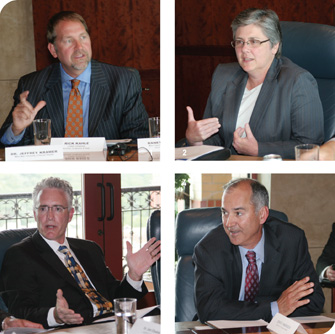
1. Rick Kahle saw huge benefits coming from patients’ having ready access to their health records. | 2. Danette Wilson asked the probing question of whether health-care information technology was as advanced as it needed to be. | 3. Nathan Granger said IT challenges required huge investments of time from staff and physicians. | 4. Chris Hansen noted that, once the productivity issue was resolved, use of data could improve the quality of care.
IT Readiness
Like many of the participants, Danette Wilson was not inclined to speculate on how the Supreme Court might rule. If nothing else, Wilson believes that the move to reform has sparked some new conversations among the people around the table. One conversation has been about information technology. She wondered whether the health community was to adapt to any changes in law and to take full advantage of existing technology.
Chris Hansen, senior vice president at University of Kansas Hospital, spoke to the catchphrase of “meaningful use.” As he explained, the government is willing to help hospitals and other eligible providers automate medical records if they do so in a “meaningful” way, one that accrues obvious benefits.
One of the meaningful variables is quality. To measure this, however, requires doctors to do a lot of box-checking on questions like, “Did you talk to the patient about not smoking?” This tends to slow doctors down. Still, Hansen remains optimistic.
“If you can get past the productivity issues with the system and some of the negative aspects of having to document things that people might not feel they should have to do,” said Hansen, “you’re going to have data in there that actually you can transmit to somebody, that you can actually use proactively to manage the care.”
In that his system just went live a few week ago, Nathan Granger, a family physician with the Clay-Platte Family Medicine Clinic, he had some fresh experience to share. As he noted, a physician with a chronically ill geriatric practice has been creating paper charts for 20 or so years. Trying to transform that into an electronic health record while running full blast to take care of a full panel of patients, said Granger, “is daunting.” It has taken his practice a few years to make that transformation.
Hansen observed that hospitals working with Blue KC can pre-load into their systems information on patients with chronic illnesses. Still, he does not know how small hospitals or doctor offices manage the transition. He wondered whether mandatory automation would “force consolidation of primary-care providers because they can’t afford the IT infrastructure.”
“I’ve talked to hospital executives who expect there to be more consolidations,” confirmed Jill Watson, executive director of the Metropolitan Medical Society. Some physician practices, she explained, are choosing to consolidate with their hospitals “so they don’t have to make the choices.”